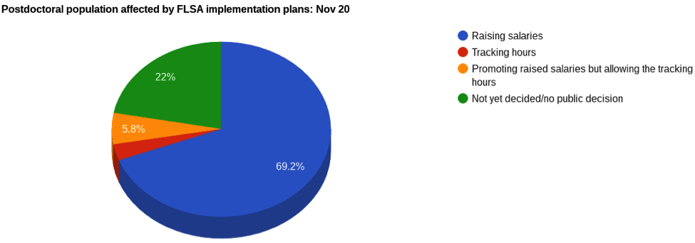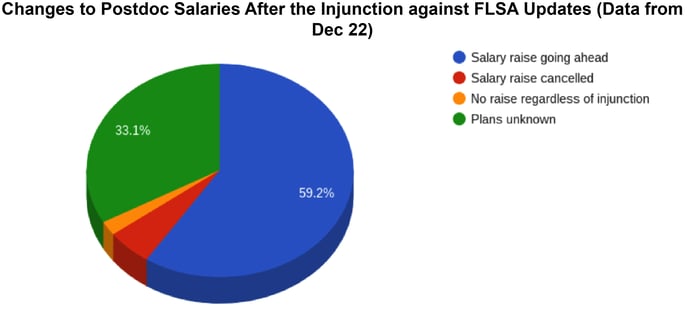This post was contributed by guest blogger, Gary McDowell, executive director of Future of Research.
On December 1st 2016, many postdocs working more than 40 hours per week could expect to see their salary raised to at least a new legal minimum of $47,476 per year, under updates to the Fair Labor Standards Act (FLSA). This was due to the threshold at which salaried workers receive overtime payment for working more than 40 hours per week increasing from $23,660 to $47,476 per year. This post discusses how a nationwide injunction against the FLSA is affecting universities' decisions to alter postdoc salaries - in some cases reversing these decisions entirely.
At Future of Research, we had been collecting data and documenting the compliance of universities with the FLSA in our online resource leading up to this date, as discussed in a previous Addgene blogpost and more recently in a paper published in F1000Research on November 2016. Due to the nature of the postdoc position, we viewed salary raising as the only viable option for compliance. However, 10 days prior to the implementation date, our data indicated that, while 69% of all postdocs were expected to receive salary raises, 6% of postdocs were to have either salaries raised or hours tracked, 3% of postdocs were at institutions focused only on tracking hours, and 22% of postdocs were at institutions where no data had been made publicly available (below).
 However, on November 22nd a preliminary injunction against the FLSA updates was granted nationwide. Again, we at Future of Research believe that, while the mandate has been removed, institutions should still go ahead with raises, as for years there have been recommendations that postdoc salaries be raised to $50,000 - higher than the level being raised to now - across a wide consensus of academic stakeholders. However, while most institutions are indeed going ahead with their planned raises, some are taking the opportunity of the lapsed mandate (or are being compelled at the state level, in the case of some public institutions) to cancel plans to raise salaries.
However, on November 22nd a preliminary injunction against the FLSA updates was granted nationwide. Again, we at Future of Research believe that, while the mandate has been removed, institutions should still go ahead with raises, as for years there have been recommendations that postdoc salaries be raised to $50,000 - higher than the level being raised to now - across a wide consensus of academic stakeholders. However, while most institutions are indeed going ahead with their planned raises, some are taking the opportunity of the lapsed mandate (or are being compelled at the state level, in the case of some public institutions) to cancel plans to raise salaries.
What are institutions doing after the injunction?
We are particularly interested in whether institutions planning to raise salaries prior to the injunction are still honoring these plans. We are now collecting data on the effects of the injunction nationwide and, at exactly one month following the injunction, 59% of all postdocs are still expected to receive salary raises - down from the 69% prior to the injunction. While much of this decrease is due to an increase in the number of universities’ whose plans are unknown (up to 33% from 22%), a full 5% of postdocs who were expecting a salary increase have had that increase cancelled. Rounding out the remainder, 2% of postdocs who weren’t going to get a salary increase prior to the injunction still won’t after the injunction (see below).

Of the institutions who were planning to raise salaries before the injunction, we have found that 48 are continuing with their plans, and 17 have cancelled their plans. 2 of those raising - the University of Illinois and the University of Michigan - initially cancelled their plans, but have since reversed their position and decided to allow individual departments to go ahead with the raises as they see fit, following feedback from postdocs and faculty (at time of writing, Brigham And Women's in Boston also just announced that they were reversing their plans to cancel raises). A further 9 institutions, whose plans were not yet known before the injunction, are raising salaries, even in light of the injunction. In addition, PIs at some of the institutions cancelling plans are going ahead with raises anyway, including the entire faculty of the biochemistry department at the University of Massachusetts Medical School. We are working with postdocs at other institutions to see if we can similarly convince them to go ahead with raises.
What will these further changes mean?
The abrupt reversal in salary raises at institutions will likely have a detrimental effect on the morale of postdocs, and indeed we have been contacted by a number of postdocs who are now planning unionization at their institutions. One clear message that institutions have sent, with the lack of transparency and poor communication of their plans (many postdocs - and in some cases, faculty - have found out about what their institution is doing from Future of Research over social media, not from their institution), is how little agency they have in their salaries and benefits, and how some institutions are paying lip service to improving conditions for junior scientists but are not implementing consensus recommendations, even when a federal mandate encourages them to do so. Immediately after the injunction, as we started to hear of institutions cancelling plans to raise salaries, the only postdocs we knew for certain to still be getting their raise were: postdocs at institutions like Stanford and the Whitehead Institute, where salaries had already been raised higher previously and all 6,000+ postdocs at the University of California, who had a contract - negotiated by their union - securing higher salaries.
This decision will carry over into other aspects of postdocs’ lives. We know that many postdocs already made plans and budgets working around issues such as childcare using money from their increased salaries. In addition, salary uncertainty may be particularly problematic for two-postdoc households. To better assess the potential impact of these salary fluctuations, we are continuing to reach out to institutions with a statement indicating that we encourage them to keep raising salaries and that we are submitting Freedom of Information Act (FOIA) requests for their postdoctoral salary information as of December 1st.
Salary inconsistencies across geographical regions
When we originally started gathering this information, many assumed that those living in areas with high costs of living would get much better salary increases that those in less densely populated areas. This assumption does not appear to hold. There are institutions in Boston - Massachusetts General Hospital, Mass Eye and Ear Infirmary and Beth Israel - that are not raising salaries when all others in Boston (some of them literally across the street from these institutions) are raising salaries. Postdocs at the Salk Institute in La Jolla California are not getting a raise. Meanwhile, in less densely populated places like the University of Kansas and the University of Louisville in Kentucky, the raises are still going ahead as planned. As we are receiving data from our FOIA requests, we are starting to see very interesting data on how much postdocs are actually getting paid, which we will be analyzing for future updates. But suffice it to say, salaries are showing surprisingly little correlation with cost of living at the location of the institution.
Continuing efforts to gather information and expedite change
We are continuing to update our FLSA and Postdocs resource as information becomes available, under “How institutional plans have/have not changed since the injunction”. Postdocs around the country have now begun to speak up on this issue. These salary raises are an important step forward in helping the postdoctoral population continue to pursue academic work, and to enhance the sustainability of the scientific enterprise by reducing the postdoctoral population which keeps growing despite a lack of available academic positions.
Many thanks to our guest blogger Gary McDowell!
 Gary S. McDowell is currently the Executive Director of Future of Research. He is interested in advocating for and with junior scientists, to help them navigate the scientific enterprise and promote their voices in driving changes in science. Follow him on Twitter @BiophysicalFrog and Future of Research @FORsymp.
Gary S. McDowell is currently the Executive Director of Future of Research. He is interested in advocating for and with junior scientists, to help them navigate the scientific enterprise and promote their voices in driving changes in science. Follow him on Twitter @BiophysicalFrog and Future of Research @FORsymp.
Additional Resources on the Addgene Blog
- Read Gary's Previous Article: Changing Labor Laws Bring Increased Postdoc Wages
- Read about the Advocating for Science Symposium and Workshop
- Learn about a Variety of Science Careers
Resources on Addgene.org
Topics: Science Careers, Early Career Researcher






Leave a Comment